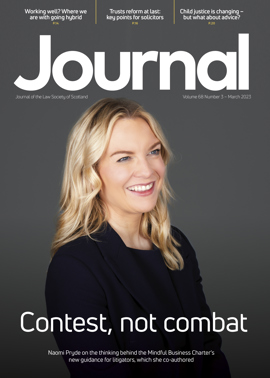Profile: Sarah Gilzean
Tell us about your career so far?
I have been very lucky in my career so far. I started out wanting to pursue an interest in equality issues and I have been involved in some very interesting work over the years. I was given my traineeship by Shona Simon and Malcolm Mackay of Mackay Simon, who were real trailblazers in employment and discrimination law in Scotland, and I was able to specialise in these areas from the start. I qualified into Maclay Murray Spens and after 10 years there I went to work in the legal team at the Equality & Human Rights Commission. There I was able to get involved in test case litigation and cases that went to the ECJ and Supreme Court. It was fantastic to work on cases which contributed to changing the law in relation to pregnancy discrimination and equal pay. I went back into private practice at HBJ Gateley and then on to Morton Fraser in 2017.
What motivated you to join the Equalities Law Subcommittee?
Society still has some way to go in terms of equality in many areas, and the work of the Law Society of Scotland plays a significant part here. I have been able to broaden my practice into other areas of discrimination law (particularly education), and I was keen to have the chance to contribute to the Society’s work in this area. The Society has put an emphasis on improving equality and diversity in the profession for some years, and I have tried to ensure that the committee has a diverse membership with a number of different voices represented.
What would you say has been a personal highlight for you?
I and another committee member took part in meetings with the UK Government in relation to proposed changes to the law on sexual harassment and harassment by third parties in relation to all the protected characteristics. Harassment in the workplace is unfortunately still a significant issue, and we were actively involved in shaping the proposals that will hopefully strengthen the law in this area in the not-too-distant future.
The theme for International Women’s Day is “Embrace Equity”. How can the profession support this?
Embrace Equity is all about recognising that women should be equal in all spheres of life but that they may have different needs in order to achieve that equality. For me there is still much to do in terms of recognising that difference and breaking down bias, stereotypes and structural inequality. The legal profession can do a lot here in terms of looking at the continuing inequalities in pay and progression and what the barriers are to female progression when so many young women are entering law. Firms need to look at how they support parents – not just mothers, as until fathers are able to participate equally in raising families, the “motherhood penalty” in terms of pay and progression will persist.
You’ve done a lot of work on menopause, including your committee responding to the UK Government’s call for evidence in 2021 and in reviewing the guidance developed with workplace health organisation Peppy. How do you think such initiatives improve the workplace – and do you think employers need to do more?
Supporting women through menopause is a no brainer for employers and makes perfect business sense. Far too many women either step back from or step out of careers completely when they start to experience difficulties due to menopause, and society cannot afford to lose all of that talent. There has been a lot of focus on guidance for employers in different sectors – and the Society's guidance is fantastic – but it is still early days in terms of seeing the benefits of that guidance being put into practice. Breaking down the myths and taboos surrounding menopause, and giving men and women the tools to be able to discuss it more easily at work without using jokes or stereotypes, is a great first step.
What keeps you busy outside of work?
Spending as much time as possible out in the fresh air with my family is really important to me, along with eating good food, catching up on new music and films and planning my next holiday!
Perspectives
Features
Briefings
- Civil court: No rule against redaction
- Corporate: Privileged or confidential – who can access
- Intellectual property: Big tech, AI and enforcement
- Succession: Non face-to-face will instructions; form C1
- Agriculture: “Route map” for agricultural reform
- Parking: About this ticket…
- In-house: Caring for the carers






